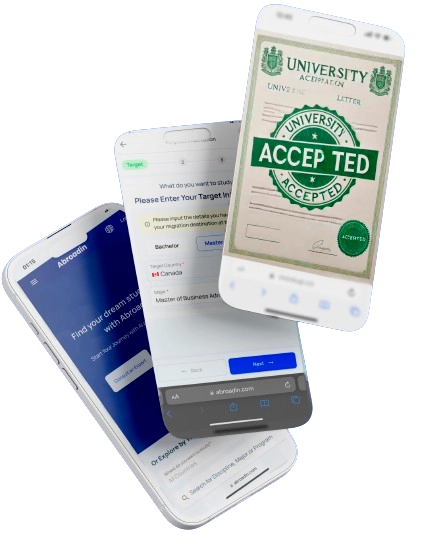

What are the Requirements to Bring Spouse to Canada?
If you’re planning to bring family members to Canada while studying, you should know the entry requirements and gather the required documents.
Canada allows international students to be accompanied by their spouse, common-law partner, and dependent children, but each family member needs specific documents to enter the country.
Here’s what you need to know:
Visitor Visa or Electronic Travel Authorization
Depending on the person’s country of citizenship, either an Electronic Travel Authorization (eTA) or a Visitor Visa is required for family members coming to Canada.
An eTA is needed for visitors from visa-exempt countries, while others will require a Visitor Visa, also called a Temporary Resident Visa (TRV).
Ensure each family member has the proper travel authorization before arriving in Canada.
Medical Examination to Bring Spouse to Canada
Sometimes, family members may need to complete a medical examination as part of the spouse visa Canada application process.
This is often required if they come from a country with more prevalent health risks. Confirm whether your spouse or children need a medical exam before arrival to prevent delays.
Document Preparation for Easy Entry
Gather and share specific documents with your family to make things smoother to bring spouse to Canada at the border. Each person should carry:
- A copy of the study permit,
- passport,
- and Visitor Visa (if applicable).
This will help border officials verify their connection to you and align their stay with the length of your study permit.
If your family members are entering Canada separately from you, having these documents is especially important.
Providing the necessary paperwork upfront helps them avoid complications at the port of entry and ensures they can join you for the entire duration of your studies in Canada.
Visitor Record for Dependents
It’s also recommended that your family members request a Visitor Record upon entry to renew their visitor status online, which can be helpful if your study period is extended.
📚 If you want to know about Dependent Visa and Its Limits in Europe and Europe Visa for Spouses read this article:

Recommendations for Dependents and Spouse Visa Canada
If you’re bringing a spouse or dependents to Canada while you study, there are a few key recommendations to make the process easier. Each family member’s immigration status can vary, so planning is essential.
The following are the steps you should consider to bring spouse to Canada:
Getting a Visitor Record at Entry
Once your family members enter Canada, ask for a Visitor Record. This document is handy because it allows your dependents to renew their visitor status online.
Without a Visitor Record, they could be required to leave Canada after six months and reapply, so this straightforward step saves time and hassle.
Coordinating Travel for Family Members Arriving Separately
If your spouse or children are arriving in Canada without you, they can still gain entry but should have a few key documents ready.
Ensure they carry copies of your study permit, Visitor Visa (if you have one), and passport, as these documents help immigration officers verify their status.
Presenting these will likely give them the same length of stay as your study permit, even if you’re not traveling together.
Health Insurance to Bring Spouse to Canada
Since healthcare in Canada can be expensive, it’s essential to look into health insurance options for each family member.
Many Canadian schools offer health insurance plans for international students that extend to dependents.
Checking with your school’s international office about these plans is a smart move to ensure everyone is covered.
What are Work Permit Options for Spouses?
If you’re wondering whether your spouse or partner can work while you’re studying in Canada, it’s a bit more complex now due to recent policy changes.
As of March 19, 2024, the rules around spousal open work permits have changed, affecting many international students and their partners.
Changes to Spousal Open Work Permit Eligibility
Previously, spouses of international students in college and university programs were often eligible for an open work permit, which allowed them to work anywhere in Canada without a job offer.
However, under the new policy, spouses and partners of undergraduate and college students are no longer eligible for these open work permits.
This means they’ll either need to apply for a different type of work permit, a spouse visa Canada, or plan to remain in Canada as visitors, though visitors cannot legally work.
Who Can Still Apply for a Spousal Open Work Permit?
Suppose your spouse accompanies you while in a graduate or professional program (such as a master’s or doctorate or programs like law or medicine). In that case, they can still apply for a spousal open work permit.
Additionally, if your spouse already holds an open work permit issued before March 19, 2024, they can extend it as long as you’re a full-time student in a program that meets Post-Graduation Work Permit (PGWP) requirements.
There’s also good news for spouses who want to work after you graduate. If you secure a PGWP after your studies, your spouse can apply for a spousal open work permit, provided you meet specific criteria.
Alternatives for Spouses Ineligible for an Open Work Permit
Suppose your spouse isn’t eligible for an open work permit. In that case, they can still come to Canada as a visitor with a Temporary Resident Visa (TRV) or eTA, depending on their citizenship.
While they won’t be allowed to work, they can still live with you in Canada during your studies.
📚 If you want to know more about Tuition Fees and Living Costs in Canada read this article:

Guidelines for Children and Bring Spouse to Canada
If you bring your kids to Canada, you should know the rules for enrolling them in school and other activities for kids.
Canada has specific guidelines for minor children, which vary based on age and the parent’s status. Here’s a quick rundown to help you get organized.
Study Permit Requirements for Children
In Canada, minors generally need a study permit to attend school, but there are exceptions.
For example, children under six years old who will attend preschool or primary school (known as “Grade Primary”) don’t need a study permit if they’re only attending a short-term program.
A study permit is required for older children planning to join the school system in Canada.
The good news is that as long as one parent has a valid study or work permit, your children don’t need a separate letter of acceptance from the school to apply for their study permit.
Special Considerations for Nova Scotia
If you’re studying in Nova Scotia, remember that minors are anyone under the age of 19.
This means that your kids can attend school with the proper permits up to that age, so even teenagers can come along and stay enrolled in high school without issues.
Essential Documentation for Traveling with Kids
Canadian border services require a few key documents when traveling with your kids, especially if only one parent accompanies them.
Make sure to have a copy of each child’s birth certificate and a letter of authorization from the non-traveling parent (if applicable).
The letter should be signed, include the non-accompanying parent’s address and contact details, and ideally be in English or French.
To be safe, you’ll also want a copy of the non-accompanying parent’s passport or national ID.
How to Travel with Minor Children?
If you’re planning to bring your kids to Canada, you must take a few extra steps if you’re traveling without your spouse.
Canadian border officials are highly vigilant about the safety and protection of children, especially those traveling with just one parent or guardian.
To ensure you’re prepared, here’s what you’ll need to have on hand.
Required Documents for Single-Parent Travel
When entering Canada with minor children without your spouse, you must carry specific documents to prove your right to travel with them.
First, bring a copy of your child’s birth certificate, which helps officials verify the relationship. You’ll also need a letter of authorization from the non-accompanying parent.
This letter should include the non-traveling parent’s address and contact information and should be signed by them. For an added level of security, it’s best if the letter is in English or French.
Additionally, border officials usually ask for a photocopy of the non-traveling parent’s passport or national identity card. This isn’t mandatory but is strongly recommended, as it can help prevent any potential delays or issues when entering Canada.
Additional Tips to Bring Spouse to Canada
While the above documents are key, there are a few extra steps you can take to ensure a seamless process.
It can be helpful to prepare your children by letting them know that border officials might ask them a few questions to confirm their relationship with you.
This is standard practice to ensure child safety and is nothing to worry about, but being ready can make it a little easier on everyone.
Taking these precautions helps ensure you and your kids can enter Canada smoothly, ready to settle into your new lives together.
Conclusion
Preparation is key, from understanding spouse visa Canada requirements for dependents and securing work permits for spouses to ensuring your kids have the necessary documentation for school.
By staying informed about the latest immigration rules and planning for health coverage and financial needs, you can help your family settle in smoothly and enjoy your time in Canada.
If you have any questions regarding bring spouse to Canada or other aspects of the study visa for Canada, just leave a comment below. Abroadin consultants are here to guide you through this journey.
https://www.canadavisa.com/study-in-canada-bringing-a-partner-and-family-members-to-canada.html
https://www.canadim.com/study/live-as-a-student-in-canada/spouses-family/
FAQ
Here are the most frequently asked questions about the top study abroad consultants for Indian students:
Yes, you can bring spouse to Canada while studying, but she will need the appropriate documentation. If you are an international student, she can apply for a Visitor Visa or Electronic Travel Authorization (eTA) depending on her citizenship.
As of March 19, 2024, the rules for spousal open work permits have changed. Spouses and partners of international college and undergraduate students are no longer eligible for open work permits.
Processing times can vary depending on individual circumstances and application volumes, so it’s advisable to check the official Government of Canada website or consult with respected immigration authorities.
For downloading PDF of the article fill the form


How useful was this post?
Click on a star to rate it!
Average rating 5 / 5. Vote count: 2
No votes so far! Be the first to rate this post.








No comment yet, add your voice below!